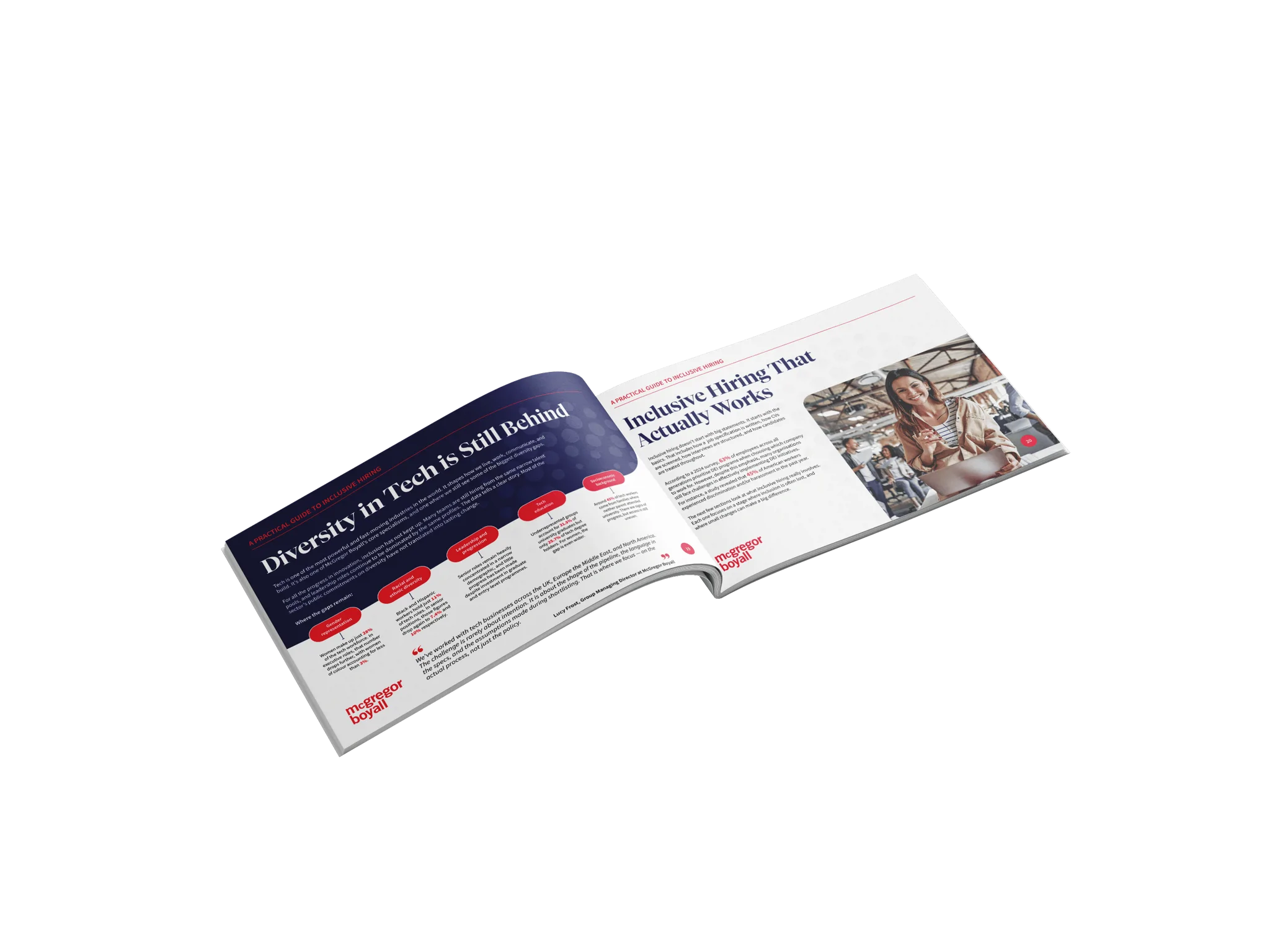Article
Diversity in Tech Contracting: Strategies for Inclusive Hiring
15 Apr, 20248 min
Diversity is essential in the future of progress in the consistently developing world of technology, where innovation, creativity, and new ideas are the norm. However, while inclusivity is often prioritised within permanent tech teams, the same level of attention is not always extended to tech contractors. This oversight presents a significant missed opportunity.
Tech contractors play a pivotal role in driving innovation and meeting the ever-changing demands of businesses. Their specialised skills and varied perspectives fuel dynamic problem-solving and innovative solutions. Yet, organisations risk narrowing their talent pool without a commitment to diversity.
In this guide, we'll discuss the importance of diversity in tech contracting roles and provide practical strategies to integrate inclusive hiring practices into your recruitment processes.
Understanding the Value of Diversity in Tech Contracting
Tech contract workers are crucial in organisations, providing specific skills and expertise for various projects. Despite being one of the most diverse segments of the workforce, tech contract workers still face barriers to inclusivity in the hiring process. Several studies emphasise the importance of diverse and inclusive hiring practices in the tech contract sector, given the flexible and diverse nature of tech contract workers and the industry's ongoing talent shortage.
The tech sector, which relies heavily on contract hiring, is growing three times faster than any other sector. It generates substantial revenue and constantly develops innovative technologies that require diverse specialist knowledge. However, unfair treatment in the workplace remains a significant driver of turnover in the tech industry, costing companies up to £4 billion per year.
Despite comprising a higher proportion of tech contract workers, women, gender-expansive individuals, and individuals from diverse backgrounds encounter barriers when accessing opportunities through inclusive hiring practices. Studies indicate that individuals of colour constitute 42% of the contract workforce, contrasting with just 22% in full-time tech roles, highlighting the disparity in representation between contract and permanent positions that need to be addressed.
Benefits of Embracing Diversity
Industries with large numbers of contract workers also tend to have the most diverse levels of employee representation. McKinsey & Company found that businesses with greater diversity in their workforce tend to perform better in terms of long-term profitability.
Embracing diversity in tech contracting roles offers numerous benefits, including:
- Represents society: A diverse workforce reflects businesses' diverse culture, promoting a more inclusive hiring environment.
- Future-proofS the organisation: By embracing diverse perspectives and skills, employers can more effectively adapt to changing market dynamics and technological advancements.
- Aligns with competitive goals: Companies encouraging diversity and inclusion are better positioned to attract and retain top tech talent, giving them a competitive edge in the market.
- Attracts the brightest minds: Inclusive workplaces are more attractive to skilled professionals seeking opportunities for growth and development.
- Enhances reputation: Organisations prioritising diversity and inclusion are perceived more positively by employees, customers, and investors, improving their overall reputation.
- Provides access to a larger talent pool: Embracing diversity allows businesses to tap into a broader talent pool, increasing the likelihood of finding suitable candidates for tech contracting roles.
In light of the tech talent shortage, it is imperative to support inclusive hiring practices to ensure the industry's continued growth and success.
Top Strategies for Successful Inclusive Hiring
In today's tech-driven world, the demand for skilled contract workers has reached unprecedented levels as businesses increasingly rely on their expertise to tackle critical projects and fill essential roles. However, a common misconception persists that the temporary nature of contract positions exempts employers from considering the diverse needs of these professionals. This oversight overlooks a valuable talent pool and jeopardises the retention of skilled tech contract workers.
Tech contract workers often enjoy a unique flexibility in their roles, granting them the freedom to choose where they work. This autonomy highlights the significance of creating diverse and inclusive working environments that resonate with contract professionals' varied backgrounds and preferences. Neglecting to do so prevents efforts to attract and retain top talent and increases the challenges of navigating a tech talent shortage.
To address these issues, businesses must adopt strategies for inclusive hiring that prioritise the diverse needs of contract workers, ensuring a steady influx of skilled professionals while encouraging a culture of inclusivity in the tech industry.
Growing an Inclusive Company Culture
Company culture should reflect deep-rooted diversity and inclusion values, not just serve as a superficial recruitment tactic. Tech contracting professionals seek businesses with a genuine commitment to inclusion, as reflected in the company culture, to ensure long-term retention.
Research indicates that businesses with diverse leadership teams are 33% more likely to outperform their peers in profitability—companies prioritising diversity and inclusion from the top down experience higher levels of employee engagement and retention. Let’s discuss how to develop a welcoming and transparent workplace culture.
Create a Comfortable and Engaged Workforce
Creating affinity groups and support networks for underrepresented employees offers valuable resources and networking opportunities for all, regardless of employment status. These groups provide community support and empowerment, creating a more inclusive workplace culture.
Research conducted by Deloitte found that employees participating in affinity groups are 67% more likely to feel satisfied with their career progression. Additionally, companies with active affinity groups experience a 46% increase in employee engagement.
You can promote this by establishing open communication channels where employees feel comfortable discussing diversity and inclusion issues. This may include hosting regular town hall meetings or focus groups to gather employee feedback and insights on diversity-related matters.
Diversity Considerations
Tech contractors attracted to businesses offering opportunities for skill advancement and development expect Employee Value Propositions (EVPs) to mirror the diverse company culture being cultivated. This includes considerations for work-life balance and flexible working arrangements tailored to accommodate the alternative nature of tech contracting roles.
A diverse leadership team is crucial in inspiring diverse talent to apply and create a workplace environment where tech contractors feel comfortable and supported despite short-term engagements.
Building an inclusive company culture requires ongoing commitment from leadership and active participation from all employees. Depending on your abilities, offering flexible working arrangements, such as remote work options or flexible hours, can appeal to a diverse range of tech contractors by accommodating a range of employee needs.
Recognise and Celebrate Diversity
Acknowledging and celebrating diversity is crucial for creating an inclusive hiring environment in the tech industry. Embracing cultural diversity within the workplace allows businesses to tap into a wide range of talent and skills. This is especially important for tech contract workers with unique perspectives and expertise.
By acknowledging and celebrating diverse cultural holidays and observances, companies can promote inclusivity and strengthen employee relationships. Incorporating these celebrations into company culture encourages understanding and respect for different cultures and backgrounds.
To ensure accurate representation and encourage inclusivity, highlighting diverse role models and success stories can inspire tech contract workers to pursue their goals and reach their full potential.
Regularly reviewing and updating HR policies is essential to continue attracting talent and ensure inclusivity and fairness. Implementing inclusive recruitment and promotion practices helps to enrich teams and their knowledge.
Implicit Bias Training
Implicit bias, often unconscious attitudes and stereotypes affecting our perceptions and actions towards others, is a significant issue in the tech industry. Given the pronounced gender and racial disparities in tech, addressing implicit bias becomes directly associated with harnessing diverse talent.
The research highlights the severity of gender and racial disparities in the tech sector, with statistics showing that 68.5% of tech workers are white, significantly higher than the average of 63% in other industries. Recognising this, it's essential to implement implicit bias training for hiring teams to raise awareness of unconscious biases that may influence recruitment decisions.
To maximise the effectiveness of implicit bias training, provide comprehensive sessions that delve into the concept of implicit bias and its impact on hiring practices. Studies have suggested that such training can increase participants' understanding of unconscious bias, but only if executed effectively.
Below, we have highlighted some key ways to ensure you maximise the effectiveness of implicit bias training.
Providing diversity training for all employees
An inclusive hiring company culture begins with educating all employees about unconscious bias, microaggressions, and inclusive communication. This training promotes a respectful and understanding workplace environment where everyone feels valued and respected. No matter who is in your business, every person should be engaged in training, no matter the length of a contract.
Studies show that businesses with comprehensive diversity training programs experience a 58% increase in innovation and creativity among their workforce. Businesses that invest in diversity training report a 22% reduction in employee turnover rates.
Regular implicit bias training sessions help embed inclusive practices into the company culture and increase awareness of bias over time. Studies show that consistent and ongoing training is more likely to be effective in shifting behaviours and attitudes.
Explore the How
Provide practical strategies and techniques for identifying and mitigating specific biases in the hiring process, enhancing training effectiveness. Training should not only focus on understanding what implicit bias is but also on how to overcome particular aspects of bias effectively.
Take a Direct Approach
No matter how inclusive your hiring practices are, disparities may occur in the tech industry, particularly among contract workers. To address these issues, it's essential to provide opportunities for employees affected by bias to share their real-life experiences. These firsthand accounts offer valuable insights that can guide hiring managers and leaders in effectively making specific changes to combat bias and discrimination.
Encouraging open discussions about bias promotes awareness and empathy among hiring teams. Organisations create a supportive environment where individuals feel heard and valued by inviting employees to share their experiences of prejudice and discrimination.
These discussions not only raise awareness of the challenges faced by marginalised groups but also promote understanding and empathy among colleagues, contributing to more equitable hiring practices and a more inclusive workplace culture.
Implementing Inclusive Interview Processes
Recruiting and interviewing diverse tech contractors can encounter numerous inclusivity and bias obstacles throughout the application and interview stages. As the tech industry thrives on innovation and diversity, businesses must address these challenges by implementing inclusive interview practices tailored to attract and retain top tech talent from diverse backgrounds.
Structuring Interviews to Minimize Bias
It is essential to design interview processes that evaluate candidates' skills, experiences, and potential rather than subjective judgments. Research indicates that structured interviews, employing predetermined questions and evaluation criteria, are more effective in predicting job performance and reducing bias than unstructured interviews.
According to a study by Harvard Business Review, structured interviews reduce the likelihood of biased hiring decisions by 51%.
Including Diverse Interview Panels
Creating diverse interview panels representing various backgrounds, perspectives, and experiences can mitigate individual biases. Studies show that diverse interview panels lead to more balanced and fair evaluations of candidates. Contractors are also more likely to feel comfortable and valued when interviewed by a diverse board, leading to more inclusive hiring decisions.
A Glassdoor survey found that 67% of job seekers prefer workplaces with diverse teams, highlighting the importance of inclusive interview panels in attracting top talent.
Using Competency-Based Assessments
Shifting the focus of interviews towards competency-based assessments measuring candidates' skills and abilities relevant to the job role is crucial. Developing standardised assessment criteria aligned with job requirements ensures fairness and impartiality in candidate evaluation, eliminating biases related to factors such as gender, race, or age.
Top Ways to Eliminate Unconscious Bias Within the Recruitment Process:
- Appoint a Diverse Interview Panel: Research indicates that candidates are more likely to feel comfortable and valued when interviewed by a diverse panel, leading to more inclusive hiring decisions.
- Stick to Specific Criteria: Clearly defining job requirements and selection criteria ensures hiring decisions are based on candidates' qualifications and skills rather than subjective impressions.
- Anonymous Applications: Implementing anonymous application processes removes identifying information such as name, gender, and ethnicity, reducing the likelihood of unconscious bias influencing initial screening decisions.
- Utilise Technology: Leveraging technology tools that anonymise candidate information, analyse job adverts for inclusivity, and provide anonymised feedback on hiring processes can help identify and address potential biases.
By implementing these inclusive interview practices and leveraging technology-driven solutions, businesses can create a more equitable and diverse recruitment process for tech contract workers. This will attract top talent from all backgrounds and promote a culture of inclusivity in the tech industry.
Tracking and Measuring Diversity Metrics and Consistently Developing
Diversity and inclusion are crucial for driving innovation and a varied workforce. However, despite growing awareness, many businesses struggle to achieve diversity, particularly in tech contracting roles where specialised skills are in high demand.
Tracking diversity metrics enables businesses to measure the effectiveness of their inclusive hiring practices and identify areas for improvement. By analysing data on diversity in contracting roles, companies can assess the representation of underrepresented groups, identify recruitment trends, and evaluate the success of diversity initiatives.
This data-driven approach ensures accountability and informs strategic decision-making to attract and retain diverse tech contract talent with specialist skills
Monitoring diversity metrics for informed and inclusive hiring practices in the tech industry:
- Define Clear Diversity Goals: Establish specific diversity goals and key performance indicators (KPIs) tailored to tech contracting roles. These goals should include increasing the representation of underrepresented groups and reducing hiring bias.
- Collect Comprehensive Diversity Data: Gather data on various diversity dimensions such as gender, race, ethnicity, age, disability status, and sexual orientation. Ensure data collection methods comply with privacy regulations and respect individuals' confidentiality.
- Analyse Hiring Metrics: Evaluate hiring metrics such as applicant demographics, interview outcomes, and hiring rates by demographic group. Identify any disparities or patterns indicating bias and take corrective action to promote fairness and inclusivity.
- Monitor Retention and Promotion Rates: Track retention and promotion rates for tech contract workers and employees from diverse backgrounds. Analyse whether certain groups face barriers to career advancement and implement strategies to address disparities.
- Conduct Regular Diversity Audits: Perform periodic audits of hiring processes and workplace policies to assess their impact on diversity and inclusion. Solicit feedback from employees, including tech contract workers, to identify areas for improvement and implement targeted interventions.
By implementing these strategies and actively monitoring diversity metrics, businesses can promote inclusive hiring practices and create a more diverse and equitable workplace for tech contract workers and other employees in the tech industry.
Paving the way for Inclusive Hiring Practices: Final Thoughts
The imperative for diversity and inclusion in tech contracting is clear. The multifaceted nature of the tech industry demands innovation, creativity, and diverse perspectives to thrive. Yet, despite the evident benefits, many organisations still fail to ensure inclusivity in their contracting practices.
The journey towards supporting diversity and inclusivity in tech contracting begins with a fundamental shift in organisational culture. It's not only about implementing policies but also about incorporating diversity and inclusion into the company ethos. From the top down, companies must put variety at the forefront of their policies, provide comprehensive training to mitigate implicit biases and create supportive networks for underrepresented groups.
Embracing diversity and inclusion in tech contracting isn't just the right thing to do—it's essential for business success. As we move forward, businesses must commit to building truly inclusive workplaces where every voice is heard, every perspective is valued, and every individual can thrive if they wish to utilise the skills of contract workers.
Streamlining Contract Recruitment Solutions
Our consultants excel in tech contract recruitment, offering specialised solutions tailored for tech industry professionals. Whether you're in finance, FMCG, IT, media, or clean energy, our team of contractors possesses the time-tested skills and expertise necessary to drive successful business change and digital transformation projects within the tech sector. With a proven track record of collaborating closely with leading organisations in the tech industry, our contract recruitment services are designed to provide comprehensive support every step of the way.
Contact us today to discuss how we can meet your specific needs in tech contract recruitment.



